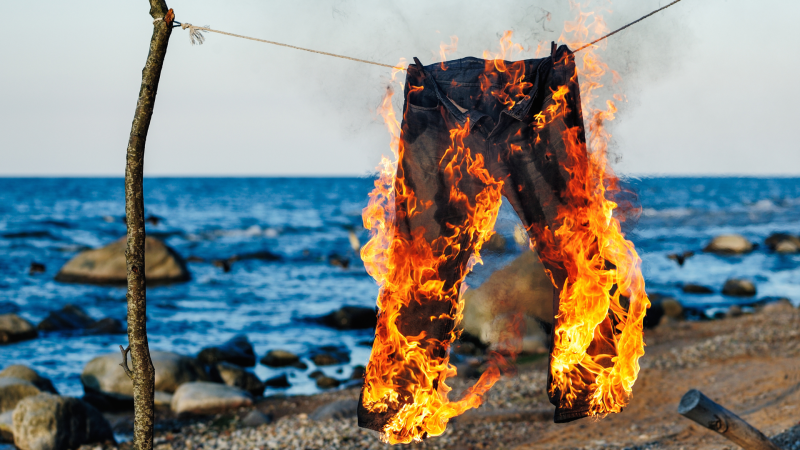As a kid, you probably uttered “liar, liar pants on fire” regularly. However, as an adult, you may only use it when there’s a big election coming up.
It was a clever phrase many used to describe when someone was lying, but where did it come from?
Today, we’re going to take a look at the origin of not only this famous phrase but also several others. We’ll find out where they started and what they mean.
Let’s get started!
What’s the Full Saying of Liar Liar Pants on Fire?
Did you know there’s more to the saying than simply “Liar, liar pants on fire?” The whole expression is, “Liar, liar pants on fire. Nose as long as a telephone wire.” However, most of us only recognize the first portion of it.
The part that often gets cut off is a tribute to the story of Pinocchio. Remember him? The boy that Gepetto carved from wood.
The wooden creation had a nose that would grow with every lie he told. On the other hand, when he told the truth, it shrunk to its average size.
Another version takes it further and adds, “While you’re there, cut your hair and stick it down your underwear.”
However, it probably was shortened after children were too afraid of getting their mouths washed out with soap from their parents.

What’s the Reply to Liar Liar Pants on Fire?
With such a witty saying and declaration, it deserved an equally amusing response. Those accused of lying might say, “I don’t care, I don’t care, I can buy another pair.” They’d rather buy a new pair of pants than tell the truth.
Just like the playful teasing of someone chanting the initial phrase, the response is fitting. Either way, you shouldn’t take either of them seriously. However, telling the truth is always a good idea.
HOT TIP
Check out these 5 RV Police Chases! Read more to find out how they ended.
History of the Saying Liar Liar Pants on Fire
While you might think the phrase “liar, liar pants on fire” was original to your generation or the generation before you, it’s certainly not.
Evidence points to a similar phrase dating back to the 1400s, “liar, liar, lick-dish!” The idea was that the individual lied as fast as a dog can lick a dish.
Over the next several hundred years, the phrase evolved through literature. Numerous versions included liar and fire, but none had pants.
It was in the 1930s that the words we’re familiar with came to be. It was first printed in the Sunday World-Herald in 1933 as a quote from a wrestling promoter.

Other Popular Sayings and Their History
So, if “liar, liar pants on fire” has a history, what about other popular phrases? Let’s look at other common sayings you’ve likely used and learn about their history.
Bite the Bullet
When you hear someone use the term “bite the bullet,” it’s often about a painful and tricky situation.” It could be a difficult conversation or experience they know will be tough.
The origins of this phrase date back to the 19th century on battlefields. Unfortunately, medical treatments were nowhere near what they are today.
Instead of anesthesia, soldiers received a bullet to place between their teeth and bite down on. Surgeons would then extract items and other materials from the wounds of soldiers.
Today, we use the term to summon strength to persevere and do something hard. Luckily, modern medicine has evolved, and we no longer use the phrase for its original meaning.
Break a Leg
It’s bad luck to wish someone “good luck” in the theater world. Instead, you tell them to “break a leg.” While it sounds slightly more vulgar and dark, the theater world has embraced the phrase.
One theory for this phrase is that if “good luck” is bad, wishing someone bad luck would be good luck. Right? We know it’s confusing, but it’s become widely accepted in theater and entertainment.
Cat’s Out of the Bag
Another common phrase, the “cat’s out of the bag,” refers to the revealing of a secret or disclosure of private information. Again, the origins of this phrase date back much further than you might think.
The earliest usage was in the 18th century when farmers sold pigs and other livestock at markets and fairs. Owners would transport the animals in sacks or bags to sell.
However, some seedy sellers would replace pigs and other valuable livestock with cats. It was when the buyers opened the packs once they got home that they realized the seller had deceived them.
Don’t Cry Over Spilled Milk
“Don’t cry over spilled milk” is another popular idiom. However, depending on the price of a gallon of milk, it may be more accurate at certain times than others.
The phrase means not allowing yourself to dwell on past mistakes. It encourages people to accept the reality of a situation and move on since they cannot change it.
The phrase has been used in a variety of cultures and languages. In English, there’s evidence of its usage dating back to the 17th century.
James Howell, a famous writer in the mid-1600s, wrote, “No weeping for shed milk.” While the wording was slightly different, the meaning is the same.

Burning the Midnight Oil
Someone who is burning the midnight oil is an individual working late into the night. It is also often used to describe someone giving more effort to a task or project than others. However, the origin of this phrase dates back hundreds of years.
The phrase “burning the midnight oil” referred to the days before electricity. Those staying late at night to work on projects used oil lamps and candles for light. They couldn’t simply flip a switch and light up the entire workspace.
Raining Cats and Dogs
If you’re ever in a severe downpour, you may say, “It’s raining cats and dogs.” However, no dogs or cats are in the storm. It’s simply a colorful idiom used to describe the current weather conditions.
There’s no exact pinpoint for the origin of the phrase. However, many point to Norse mythology because cats and dogs were associated with storms and heavy rains.
Cats represented heavy rains, and dogs were a symbol of the dead. A combination of the two was a terrible and frightening combination.
The Whole Nine Yards
The final phrase you may have used is “the whole nine yards.” Many people use this idiom to do everything possible in a situation.
Individuals give their best effort to accomplish a task or project. If someone gives it everything, you might say they gave “the whole nine yards.”
So where does it come from? Well, unfortunately, it’s another phrase with only theories.
The leading theory for this idiom is that World War II fighter planes had nine yards of ammunition belts. A pilot may state they “gave it the whole nine yards” of ammunition to say they gave it their best effort.
HOT TIP
Be sure to read Does Your Phone Really Need to be in Airplane before taking your next flight.
Should You Use Liar Liar Pants on Fire?
Idioms are a fun and colorful way to communicate ideas. While they may not always make sense, they spice up a conversation and our language.
It may be better to worry about someone using the phrase “liar, liar pants on fire” to you than you having to use it on someone else. You can’t control if others tell the truth, but you can be sure that you’re always honest with others.
If You Want the Latest Travel News, Join Our Mailing List
Don’t rely on biased RV industry news sources to keep you informed. Stick with Nomadic News. We publish articles and breaking stories that matter to you every weekday.










